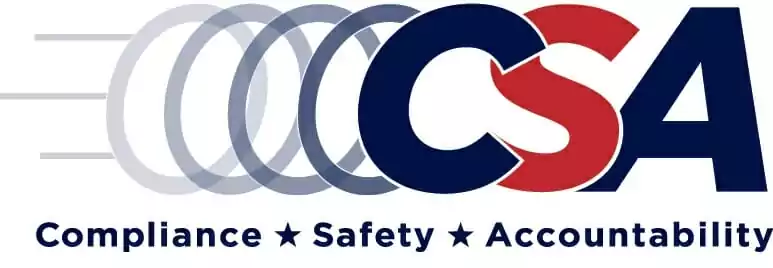
Truck driving is a dangerous job, and it remains one of the most regulated industries in the country. Because of the rapid growth of the trucking business, the Compliance, Safety and Accountability Program (CSA) was created to provide updates and replacements to an outdated set of safety regulations and testing and enforcement methods.
The Federal Motor Carrier Safety Administration (FMCSA) regulates the CSA program with the goals of improving truck safety and ultimately reducing crashes, injuries, and fatalities

What are CSA Points?
The main goal of the CSA is to make the roads safer for everyone on them. In order to make this possible, motor carriers and truck drivers are held accountable for their role in safety.
The FMCSA assigns “points” to drivers to keep track of their compliance and performance within this program; these are known as CSA points. These severity weight “points” range from 1 to 10 with least serious violations rated a 1. Points get closer to 10 as they get more severe. You want to have as few points as possible.
How do CSA points affect the truck driver?
When you have a safety violation, CSA points are added to your CDL and can even cause you to lose it! Truck drivers work very hard to get their CDL, so the CSA points program adds even more emphasis on the need to drive safely rather than pushing to make a deadline.

Some examples of how you can receive points are for speeding, reckless driving, possession of drugs, improper lane change, and even failure to understand the English language in order to decipher road signs and signals.
Every month the FMCSA gathers information through the Safety Measurement System (SMS).
Information is collected from roadside inspections, crash reports, investigation results, and registration details and points can be assigned based on these findings. Trucking companies are also given points based on the performances of their drivers and their performance within the above mentioned bullet points.
What does the CSA program cover?
- Unsafe driving: Operation of vehicles by drivers in a dangerous or careless manner such as speeding, driving recklessly, and distracted driving.
- Hours-of-Service compliance: Driver gets points for violating the mandated breaks and schedules.
- Driver fitness: Operation of vehicles by drivers who are unfit to drive due to lack of training, experience, or medical qualifications.
- Controlled substances/alcohol: Drivers who are impaired due to alcohol, illegal drugs or the misuse of prescription drugs.
- Mobile device violations: Texting or using a mobile phone while driving.
- Vehicle maintenance: Covers failure to properly prevent shifting loads. Other violations include malfunctioning or worn down brakes, no lights, failures to make required repairs and improper load securement.
- Hazardous materials: Drivers must have the proper shipping papers, placards, and markings while driving with hazardous materials.
- Paperwork violations: This includes falsified or improper logs or driving with the wrong license.
- E-Logs and/or Electronic on-board computer (EOBR) violations: Includes device failure or if device is used improperly.
- Bus violations: Includes operating a bus under many of the aforementioned conditions, such as fatigue, improper license, etc.
Can trucking companies check your CSA score?
When you apply to a trucking company, they can use the FMSCA’s Pre-Employment Screening Program (PSP) to check your five-year crash and three-year inspection history. This requires your consent, but of course, they reserve the right not to hire you.
Many companies have strict hiring requirements, so safety is paramount. Trucking companies cannot use the PSP to check on their current drivers.
The most important takeaway from learning about the CSA score is that the program was designed to keep the roads and the drivers safe through a data-driven approach. This data, in the form of points, stays with you through your work as a professional driver. So put your own safety first, not just because it will keep you health but also because your career depends on it.
